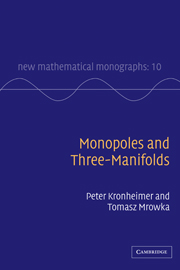Book contents
- Frontmatter
- Contents
- Preface
- I Outlines
- II The Seiberg–Witten equations and compactness
- III Hilbert manifolds and perturbations
- IV Moduli spaces and transversality
- V Compactness and gluing
- VI Floer homology
- VII Cobordisms and invariance
- VIII Non-exact perturbations
- IX Calculations
- X Further developments
- References
- Glossary of notation
- Index
I - Outlines
Published online by Cambridge University Press: 19 September 2009
- Frontmatter
- Contents
- Preface
- I Outlines
- II The Seiberg–Witten equations and compactness
- III Hilbert manifolds and perturbations
- IV Moduli spaces and transversality
- V Compactness and gluing
- VI Floer homology
- VII Cobordisms and invariance
- VIII Non-exact perturbations
- IX Calculations
- X Further developments
- References
- Glossary of notation
- Index
Summary
The three parts of this chapter provide outline accounts of three different topics. While all three are central to the subject of this book, the outlines serve three different purposes. In Section 1, we give a brief account of the Seiberg–Witten invariants, or monopole invariants, of smooth, closed 4-manifolds. These invariants, discovered by Seiberg and Witten and originally described in Witten's paper [125], are now the subject of several expository papers, published lecture notes and books. Our purpose here is to review the definition and main properties of these invariants, while establishing our notation and conventions.
Section 2 covers Morse theory, and specifically the manner in which one can recover the ordinary homology of a manifold with boundary from a “Morse complex”, constructed from the data provided by the critical points and gradient-flow lines of a suitable Morse function. There are no proofs in this section. In the main part of this book, the Floer homology of a 3-manifold will be constructed by taking these constructions of Morse theory and repeating them in an infinite-dimensional setting. Proofs of the main propositions are presented only in the more difficult context of Floer homology; the finite-dimensional constructions are presented here for motivation, to provide a framework that explains the origin of many arguments. Although some notation is introduced, no essential use is made of this material in the later chapters.
- Type
- Chapter
- Information
- Monopoles and Three-Manifolds , pp. 1 - 83Publisher: Cambridge University PressPrint publication year: 2007

